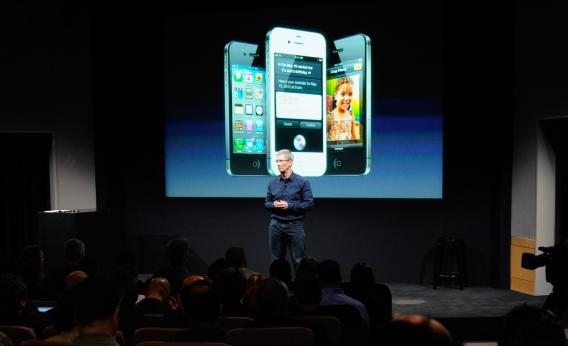Apple’s extremely generous stock award to new CEO Tim Cook has spawned a lot of misleading headlines like “Apple CEO’s Stock Awards Lift Compensation to $378 Million.” The fact of the matter is that we have no idea how much Cook will earn as a result of this, but if you look at the details it will likely be either more than that or much less.
What Apple did was give Cook a conditional award of Apple stock—a quantity of shares worth $376.2 million at the time it was issued. That’s something like 900,000 shares. Half those shares will “vest” (i.e., he actually gets them) if he’s still CEO in five years, and another half will vest if he’s still CEO in ten years. What that means is that potentially Cook will get fired and end up earning nowhere near $378 million, but very possibly he’ll earn way more than $378 million since the stock will increase in value. In particular, if the economy and stock market as a whole perform well over the next five to ten years, he could earn a huge amount more than $378 million even if the stock underperforms the market as a whole. And of course if Apple actually does well and the economy as a whole does well, he’ll earn vastly more than $378 million.
I don’t have a strong opinion about how Apple should compensate its executives, but it’s certainly striking that the CEO labor market operates in some very unusual ways. There’s no indication that Apple was in a bidding war over Tim Cook’s talents. Nor is there much indication that Apple set a price it was willing to pay for a CEO and then actively sought out the strongest candidate willing to take the position for the money on offer. Rather, it was decided (seemingly some time ago during one of Steve Jobs’ medical leaves) that Cook was the annointed successor and then a basically unrelated process determined that this should be his compensation package. And the thinking behind it largely seems to be that a great big rich company deserves to have a great big rich CEO, so here’s a generous offer. Cook was hardly obscure twelve months ago, but nobody seemed to be trying to outbid Apple for his services. That kind of practice isn’t unheard of in other contexts—it’s somewhat similar to Abe Pollin’s decision to preemptively award Gilbert Arenas a “max” contract extension even though nobody else had the cap room to pay him nearly that much—but it’s very different from the normal labor market that ordinary people operate in.
